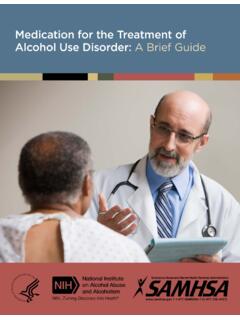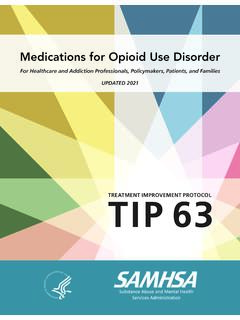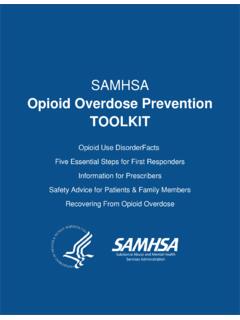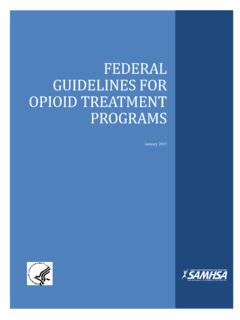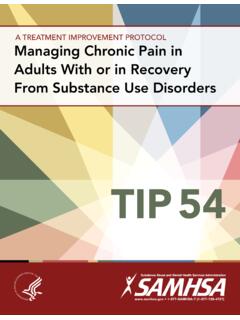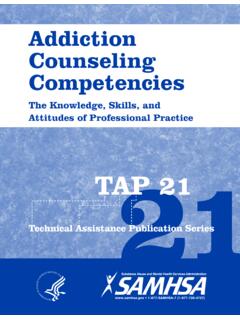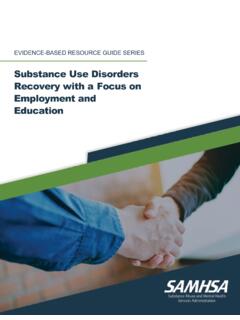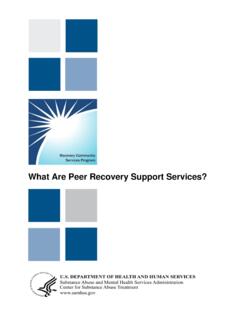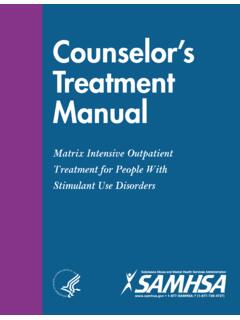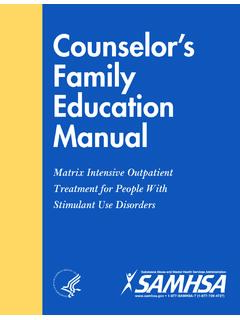Transcription of Tips for Healthcare Professionals - Substance Abuse and ...
1 tips for Healthcare Professionals : coping WITH STRESS AND COMPASSION FATIGUE. As a Healthcare professional , you may face This tip sheet explores stress and compassion stress on the job under usual conditions due fatigue, as well as signs of distress after a to long shifts, competing responsibilities, and disaster. It identifies ways to cope and enhance witnessing or hearing about difficult patient resilience, along with resources for more experiences. As a responder on the front lines information and support.
2 Of the coronavirus disease 2019 (COVID-19). pandemic, you are likely working longer hours, Stress and Compassion Fatigue seeing loved ones less, and working in a more stressful environment. At the same time, you Stress encompasses the ways that your body may be coping with the mental health effects and brain respond to something you perceive as that all types of disasters, including public health a demand in your environment. As a Healthcare emergencies, often have. As such, you may be professional , your career requires you to respond noticing signs of stress and distress in yourself to multiple demands at once, and you are likely and your coworkers.
3 Already experienced in stress management. SAMHSA's mission is to reduce the impact of Substance Abuse and mental illness on America's communities. Toll-free: 1 877 SAMHSA 7 (1 877 726 4727) | | 1. tips FOR Healthcare Professionals : coping WITH STRESS AND COMPASSION FATIGUE. Issues can arise, however, when you run short of time to recover between stressors, when you feel as though you cannot respond effectively to the many demands you face, or when you are part of a disaster-affected community and you are also having reactions to that experience.
4 Compassion fatigue includes two elements: burnout and secondary traumatic stress. Burnout is physical and mental exhaustion leading to reduced ability to cope with your environment. Burnout involves fatigue, frustration, a sense of helplessness, and reduced pleasure in work or other responsibilities. Secondary traumatic stress is the stress you may experience due to empathy with others you see going through trauma, including physical trauma such as serious injury, illness, or death. People also may experience secondary traumatic stress through empathy with others who talk with them about their traumas.
5 Signs and Symptoms of Disaster-related Distress People affected by disasters such as the COVID-19 pandemic often experience physical changes, as well as changes in thinking, emotions, and behavior. In addition to signs and symptoms of compassion fatigue, you may notice the following signs and symptoms of disaster distress in yourself and those around you. Physical Cognitive Emotional behavioral Stomachaches or Difficulty Anxiety and fear Increase or diarrhea remembering things Overwhelming decrease in activity Changes in appetite Difficulty thinking sadness levels and reduced and eating habits clearly or Anger stamina Headaches or other concentrating Guilt Frequent crying pains without a clear Confusion Numbness and Use of alcohol or physical cause Increased worry inability to feel joy other drugs in an Jumpiness or Trouble making or sadness attempt
6 To reduce exaggerated startle decisions distressing feelings response or to forget Trouble falling Angry outbursts asleep, staying Desire to be alone asleep, sleeping too most of the time much, or trouble and deliberate self- relaxing isolation Risk-taking behaviors Toll-free: 1 877 SAMHSA 7 (1 877 726 4727) | | 2. tips FOR Healthcare Professionals : coping WITH STRESS AND COMPASSION FATIGUE. Signs and Symptoms of Addressing and Preventing Compassion Fatigue Compassion Fatigue In the current highly stressful environment, you As a Healthcare professional , you probably may notice the following signs and symptoms in already understand the importance of self-care to yourself or your coworkers: maintain your ability to work effectively.
7 You need to take care of yourself first, and allow others to Increased startle response to activity around care for you, to be able to do your best work in you, a feeling of being on edge . caring for others. This section suggests strategies Difficulty making decisions for self-care, stress management, and relaxation. Based on what has worked for you in the past, Exhaustion you may want to come up with a set of strategies and schedule them on a regular basis as part of Difficulty sleeping a stress management and self-care plan.
8 Such a Impaired ability to care for patients and/or plan can be adjusted if you find it is not realistic clients or helpful. Give yourself credit for all you manage to do in the current, challenging environment. Intrusive thoughts about patients and/or clients Reduced enjoyment or satisfaction with work Self-care and Stress Management Sense of lack of control or agency in your job Do your best to attend to your physical health and consider the following: Feelings of disconnection from colleagues and work teams Try to be physically active, ideally several times each week, taking part in activities you enjoy.
9 Feelings of being overwhelmed by the amount Try walking or running, if there are places of work to be done where you can maintain a safe distance between yourself and others. (If not, try Anger and irritability exercising early or late in the day, or choosing Reduced ability to feel sympathy or empathy less sought-after routes, if you can do so safely.) You can also do push-ups or sit-ups Avoidance of reminders of upsetting at home, dancing, or anything else you enjoy. experiences with patients Many workouts are available online or on television and many do not require payment Increased use of alcohol or other drugs or equipment.
10 Strive to sleep and eat well. If possible, get enough sleep or at least rest. Aim for 7 to 9. hours a night. Do your best to eat healthy food. Drink enough fluids to stay hydrated. Try to avoid increasing use of alcohol and other drugs. Although substances may help feelings seem more manageable in the short term, they can also lead to dependence and keep you from addressing issues over which you have control. Toll-free: 1 877 SAMHSA 7 (1 877 726 4727) | | 3. tips FOR Healthcare Professionals : coping WITH STRESS AND COMPASSION FATIGUE.
